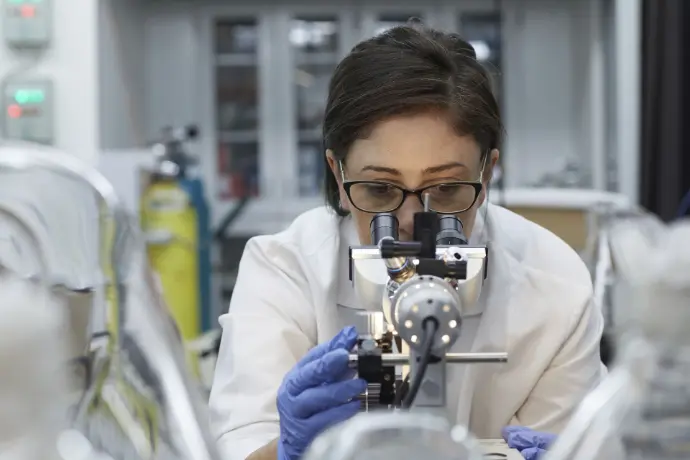About us
AK bioluminescence
Acolyte’s core technology relates to the ultrasensitive measurement of Adenylate Kinase (AK), an enzyme found in all living cells. AK provides a rapid quantitative measurement of cell number that is sensitive enough to detect a single bacteria. The AK assay is >100 fold more sensitive than existing high-sensitivity ATP based systems and shows significantly better correlation with numbers of micro-organisms present. ATP produced by the AK reaction is measured using bioluminescence. The technology has been protected by Dstl via a number of patent filings.
By coupling AK Technology to microbiological identification techniques, for example via extraction using antibody-coated beads, Acolyte can measure bacteria and yeasts faster than any other method.
Antibiotic Susceptibility Testing
Acolyte also uses AK to provide a measurement of the antibiotic resistance of a detected organism. Unlike nucleic acid-based methods, Acolyte’s system provides a measure of functional, physiological resistance of the organism that is not dependent on identifying resistance genes or whether these genes are active.
These techniques for ultrasensitive detection, bacterial identification and antibiotic susceptibility testing come together in BacLite, a product for accelerating and automating hospital microbiology workflow.
BacLite
BacLite is a system comprising an instrument and reagents, for the rapid identification (ID) and antibiotic susceptibility testing (AST) of clinically significant bacteria and yeasts. BacLite is designed to operate within the clinical laboratory, improving laboratory throughput and substantially reducing the time necessary to provide a definitive ID and AST result to the clinician.
The sensitivity of AK technology combined with specific microorganism extraction methods based on magnetic microparticles makes the BacLite an extremely powerful and versatile diagnostic tool. Identification and sensitivity tests can be performed on culture isolates or directly from clinical specimens creating a portfolio of applications within the Clinical Microbiology Laboratory. These include:
- Antimicrobial Susceptibility testing of culture isolates.
- Rapid identification of culture isolates of clinically important pathogenic bacteria and yeasts.
- Single organism screening of clinical specimens for infection (E.g. Group B Beta Haemolytic Streptococci) and multiple-resistant organisms (E.g. MRSA, VRSA, VRE)
- The direct detection, identification, and sensitivity testing of pathogenic organisms in clinical specimens (e.g. swabs, blood).
Antibiotic Sensitivity Testing of Culture Isolates
The prevalence of antibiotic resistance is increasing worldwide. One of the most important factors contributing to this increase is the inappropriate use of antibiotics, caused in part by the limitations of current antimicrobial sensitivity testing techniques. The USA Public Health Action Plan to Combat Antimicrobial Resistance (2000) developed by the Center for Disease Control and Prevention, the Food and Drug Administration, and the National Institutes for Health identified the use of rapid diagnostic methods to detect antimicrobial resistance and guide drug prescribing as one of its key focus areas to help combat the spread of antimicrobial resistance.
The ability of the BacLite to allow users to configure sensitivity panels, test individual antibiotics, and allow new antibiotics to be quickly added to the testing repertoire, offer’s a significant advantage over existing systems. This flexibility can be achieved in a faster time (<2 hours), at lower reagent cost, ensuring the BacLite offers an attractive alternative technology to existing systems.
Rapid identification of Culture Isolates
BacLite offers a developing identification repertoire. Identification of important clinical isolates is achieved within 2 hours.
Single Organism screen
BacLite can be used whenever there is a requirement to screen for the presence of a single organism within a clinical sample. This may be because the presence of a specific organism in the sample is linked intrinsically to disease potential (e.g. Group B Beta haemolytic streptococci, Neisseria meningitidis, E.coli 0157) or there is a ‘cross infection risk’ from resistant organisms such as Methicillin Resistant Staph. aureus (MRSA), and Vancomycin Resistant Enterococci. A recent Frost and Sullivan report (July, 2001) titled ‘Rapid Testing: Doctors and Bacteria Cannot Resist’ identified a growing demand within USA, and European markets for specific organism screening tests.
Over 2 million patients each year suffer from hospital acquired infections within the USA, at an estimated annual cost of more than $4.6billion (Datamonitor 2001). In the USA 8 people in every 1000 (UK: 2 in every 1000) are infected by hospital bacteria, many of which are antibiotic resistant. Control of infection procedures such as screening and contact tracing aim to limit the spread of resistant organisms within the hospital environment, and hence the associated risk of vulnerable patients acquiring resistant organisms.
Direct Detection of pathogenic bacteria from clinical specimens
The BacLite system can provide concurrent identification and sensitivity tests on a range of clinically significant organisms direct from a wide range of clinical specimens (swabs, blood, faeces, sputa). BacLite’s ability to detect the presence of multiple pathogens (e.g. Beta haemolytic Streptococci and Staphylococcus aureus in wound swabs) in the presence of commensal flora, and provide functional sensitivity tests, places it in a unique position to rapidly determine the cause and treatment of infectious diseases.
The BacLite system offers a significant advantage over genetic based tests that are often directed at screening for the presence of single organisms within clinical samples. These tests have limited diagnostic value as negative specimens have to be cultured for less common pathogens whilst positive results require additional tests, usually involving conventional culture, to determine antimicrobial sensitivity. Genetic based tests for antimicrobial resistance have limited practical use as they can only be performed on pure cultures and are not functional tests. These limitations have reduced the broad based acceptance of these tests within infectious disease diagnostics.
See a Flash presentation of Rapid Bacterial detection using AK technology .

Strategy synchronising multiple channels
Who's Who
Dr Mullen founded Acolyte in February 2000 while at ANGLE Technology. He worked closely with the company from inception until joining as CEO in 2002. From 1996-1999, Dr Mullen was CEO of Rowett Research Services Ltd. From 1993-1996 he was with Abbott Laboratories in Chicago, initially in technology acquisition (Diagnostics Division) and latterly as Operations Manager for a drug development venture. From 1986-1993 Dr Mullen worked for Cambridge Life Sciences, latterly as Head of R&D.
Stephen O'Hara was the Laboratory Manager at Southampton Public Health Laboratory for 5 years. He received his MSc from the University of Surrey and his MBA from Bournemouth University. He has over 20 years experience in Clinical Microbiology, and is the author of over 24 scientific and management publications, including Chapters in two books. He was principal lecturer for the MSc in Medical Microbiology (1993-1998) at the University of Portsmouth and has regularly organized, presented at, and chaired national and international congresses on scientific and laboratory management issues. He is a member of several national scientific committees that advise the UK government on scientific policies and is an inspector of laboratories to ensure compliance with national operating and training standards.
Mr Bowhill qualified as an accountant in 1972. In 1991 he joined Anagen as Finance Director and helped raise £12.5M of venture funds and achieved a full listing on the London Stock Exchange in 1993. Mr Bowhill has worked with Acolyte since 2000.
|
|
||||||||||||
|
|
Glyn Colebrooke MSc, FIBMS, Dip M E Mail: |
Head of Commercial Development gcolebrooke@acolytebiomedica.com |
|
||||||||||
|
|
Glyn joined Acolyte in June 2004 from GlaxoSmithKline where he was a commercial development director for personalized medicine programs. From 1989 to 2000 he held product manager positions at Amersham Kodak and Ortho-Clinical Diagnostics (J&J). He has lead the world-wide commercial development of over 20 infectious disease tests on three automated systems. Prior to his career in industry he worked for 14 years in NHS microbiology laboratories, finally as Chief Biomedical Scientist (virology) for Barnet Health Authority. |
Press Releases· March 16 2004: Acolyte Biomedica secures £3.7M funding to launch revolutionary MRSA tests · November 21 2001: · November 21 2001: · November 19 2001: · November 13 2000: Articles
Archive News Articles
|
Projects

Tony Fred, CEO
Founder and chief visionary, Tony is the driving force behind the company. He loves to keep his hands full by participating in the development of the software, marketing, and customer experience strategies.

Mich Stark, COO
Mich loves taking on challenges. With his multi-year experience as Commercial Director in the software industry, Mich has helped the company to get where it is today. Mich is among the best minds.

Aline Turner, CTO
Aline is one of the iconic people in life who can say they love what they do. She mentors 100+ in-house developers and looks after the community of thousands of developers.

Iris Joe, CFO
Iris, with her international experience, helps us easily understand the numbers and improves them. She is determined to drive success and delivers her professional acumen to bring the company to the next level.
